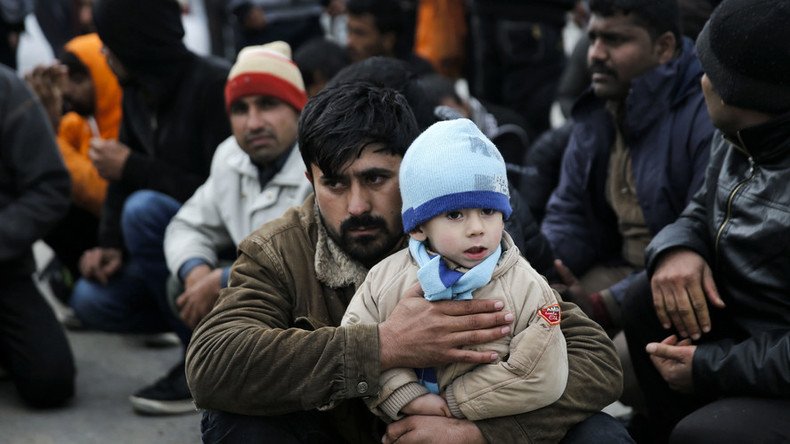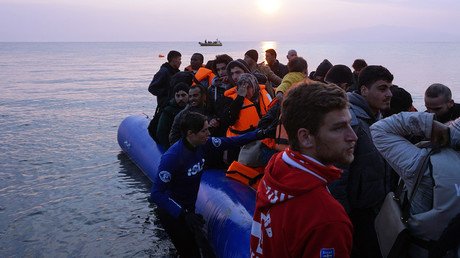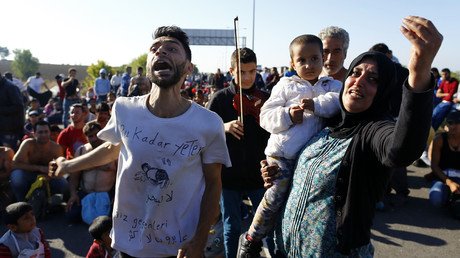Amnesty strikes out at dire conditions in Greek refugee camps amid ‘rushed’ EU-Turkey deal

Refugees housed on the Greek islands of Lesbos and Chios continue to be in the dark about their fates, with chaos arising out of scant access to legal aid and from little knowledge as to their fates in the coming weeks. Amnesty International has struck out at the recent EU deal on refugee returns.
On April 5-6, Amnesty carried out a survey of the living conditions at the VIAL and Moria centers on Lesbos and Chios, where 4,200 people currently reside. It outlined its findings in a Thursday report.
“People detained on Lesbos and Chios have virtually no access to legal aid, limited access to services and support, and hardly any information about their current status or possible fate,” Gauri van Gulik, Amnesty Director for Europe, said.
“On the edge of Europe, refugees are trapped with no light at the end of the tunnel. A setup that is so flawed, rushed and ill-prepared is ripe for mistakes, trampling the rights and well-being of some of the most vulnerable people,” she wrote.
Under the agreement that came into force on March 20, undocumented migrants coming into the EU via Greece are to be housed in special accommodation until their asylum claims are processed, while those who don’t pass will be sent to Turkey.
Many disagreements were voiced in the EU about the proposed scheme, which promised Turkey billions of euros and various political concessions. The biggest criticism had to do with Turkey’s human rights track record. But there is another problem: poor organization and illegal group detention on the Greek side, which has been leading to violent outbreaks in recent weeks. On April 1, chaos and violence led to the escape of 400 refugees.
And there continue to be many at-risk persons, including children, requiring special physiological and psychological care.
Amnesty International believes the overambitious EU-Turkey deal’s rushed implementation is one of the overarching problems.
The horrid detention conditions are the same for everyone, infants included, it states in the report. Not to mention the many who remain stranded there whose cases Amnesty believes should have been approved.
One of the major contributing factors to VIAL and Moria clogging up like this is the clear violation of the terms of the agreement, which were that requests would be considered on an individual basis. However, only two of the migrants interviewed by Amnesty were able to produce detention orders outlining individual circumstances. There were automatic group detentions as well, which Amnesty says are illegal.
Migrant smugglers use Facebook to promote Turkey-Italy trips bypassing sealed Balkan route https://t.co/2kATwLeJPRpic.twitter.com/Lzuf7ZsB1E
— RT (@RT_com) April 2, 2016
Infants with health complications from Syria and young pregnant mothers were observed among the detained at Lesbos and Chios centers. There are also many in need of psychological care and trauma counseling, as well as those with physiological conditions that require outside treatment. According to Amnesty, children and infants being placed in detention like this is a grave mistake.
“No asylum seeker should be automatically detained, and these detention centers on Lesbos and Chios are not in any way fit for purpose for the many young children, people with disabilities, or people with urgent medical needs we’ve met. They must be released immediately,” van Gulik went on.
One particular case involved an Iraqi family at Moria, which houses 3,150 of the refugees, which is 1,000 more than it can hold. They told Amnesty that since arriving last week they couldn’t find adequate medical care for their daughter of eight years of age. She was diagnosed with a hip bone infection, which is progressing and requires urgent, specialized attention.
“She’s always in pain,” her mother told Amnesty.
A similar situation with overcapacity can be seen at VIAL, which houses the remaining 1,200 people. There, Amnesty saw several families being squeezed into a 30-40 sq. meter space. What’s more, there is not much free room outside for the people to stretch their legs. One other family, from Syria, is now staying in tents, as the indoor housing is way over capacity.
On April 1 Greece introduced corrections to its current asylum processing system, but according to Amnesty, the new guidelines are still not being implemented. There was meant to be construction of new housing spaces, and authorities at both camps are awaiting the arrival of EU staff from other countries to help oversee the processing. Delays in both these matters are contributing to a growing backlog. VIAL, for example, has only one case worker: of the 833 requests filed there on April 6, only 10 were processed under the remaining older guidelines.
Reservations continue to remain about Turkey being ‘a safe third country’ for refugees to return to. "It is likely that thousands of asylum seekers will be returned to Turkey despite it being manifestly unsafe for them," Amnesty writes.
"I don't need food, I need to know what is happening," one Syrian woman told the organization.
“I escaped Syria to avoid jail, but now I am in prison,” a man, also from Syria, said.














